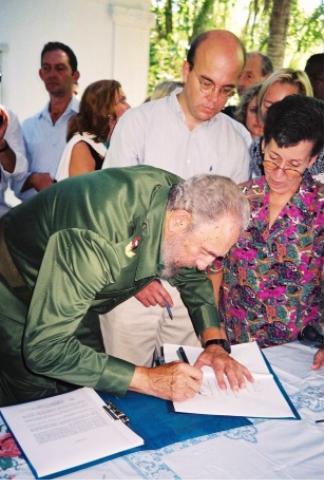“Papa” Hemingway gave one University professor the opportunity to listen to Fidel Castro in person.
Gerald Kennedy, an English professor, is vice president of the Ernest Hemingway Foundation and recently went to Cuba to participate in an event at the famous author’s former home.
“I was in Cuba for the announcement of a grant from the Rockefeller Foundation to preserve the papers and the books of Ernest Hemingway still remaining in his home there, the Finca Vigia,” Kennedy said.
The Hemingway Foundation works to preserve all documents written by or associated with Hemingway and sends most of them to John F. Kennedy Library in Boston for display.
Cuba, Hemingway’s former home, became of great interest to the foundation when a visitor discovered his letters in the basement of the home and contacted Rep. McGovern of Massachusetts. They began convincing the Cuban government to work with Americans to preserve these documents.
The focal point of the event Kennedy attended was Fidel Castro, McGovern and several people involved with the Hemingway Foundation signing an important document.
“The purpose of this document is two-fold,” Kennedy said. “One is to bring American technology and know-how to Cuba to assist in the preservation of those materials, which have been degrading under the humidity over the years. The second thing is to make sure we get good photocopies or microfilm of all the materials.”
Both Castro and McGovern spoke at the event about the importance of Hemingway and the recovery of his documents.
McGovern described Hemingway as a bridge between Cuba and America.
Although the recovery of the documents excited Kennedy, the presence of Fidel Castro was just as exhilarating.
“It would be naïve to say Castro was a heroic presence there, because there’s a lot of documentation about the kind of enforcement he has carried out in Cuba,” Kennedy said. “But, he’s a real presence. He talked very sensitively and articulately about Hemingway’s work.”
Kennedy said Hemingway was a huge influence on Castro, and the two actually met on several occasions.
“Castro actually credited Hemingway with some of the strategy that he used during the revolution that overthrew the Batista government,” Kennedy said. “He talked at great lengths about his admiration for Hemingway. It was a really extraordinary moment. Not just to see Castro, who’s been a demonized icon of socialism for 40 years, but also to encounter yet another person who knew Hemingway and represents a kind of living link to him.”
Castro’s presence at the event was intriguing to Kennedy for reasons other than the document signing.
“The presence of Castro really made me recognize the futility of our embargo of Cuba,” Kennedy said. “[America has] made it almost impossible to get food, clothing or building supplies into the country. The people are poor, and yet you can see what a beautiful country it is and what a profound transformation could be effected there if we drop the embargo and allow goods and services to flow into that country the way they’re flowing into China.”
Castro speaks at literary event
November 20, 2002

Castro speaks at literary event



